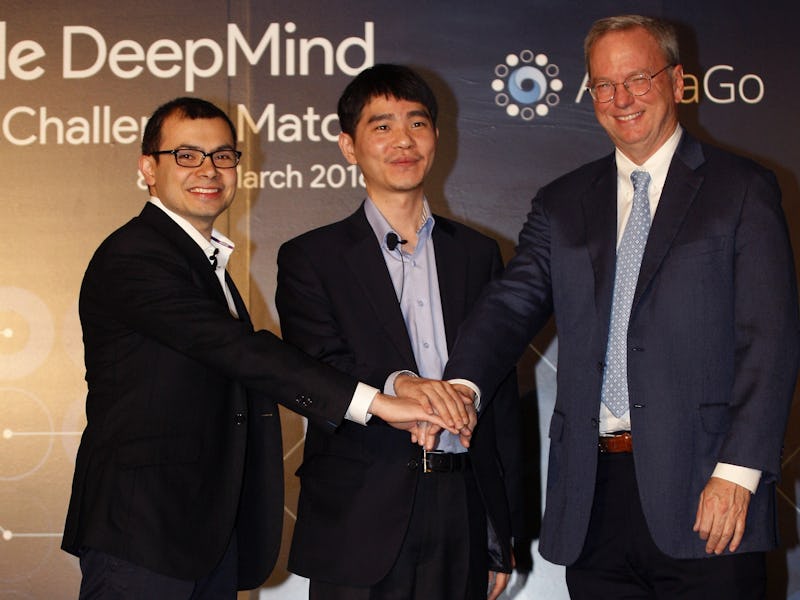Google's AlphaGo A.I. Wins First Match Against Top-Ranked Lee Sedol
Google's DeepMind A.I. scores a major win in the first match of five.

Google’s AlphaGo is an unholy artificial intelligence hellbent on beating human beings at the ancient game of Go. And on Wednesday, it ground out a hotly-contested win in the first of five matches against Lee Se-dol, one of the human race’s strongest players.
AlphaGo already has one professional win under its belt — it beat Fan Hui 5-0 in a similar bout back in October of last year, but Sedol is widely regarded as one of the best Go players of his generation. Fan Hui is a 2-dan ranked professional, while Sedol is a 9-dan, the highest possible rank, equivalent of a chess grandmaster. Sedol has 18 international championships to his name, second to only fellow 9-dan Lee Chang-Ho.
The match was a drawn-out, nail-biting war of attrition, centered around a fierce early battle in the bottom left portion of the board and an evenly-matched mid game, but ended when Sedol resigned with about 30 minutes left on his clock. Each player has a cumulative two hour time limit to make their moves, and this game nearly went the distance. AlphaGo only had about five minutes on its counter when Sedol resigned.
“Compared to the games from the fall which were relatively peaceful games, this was a slugfest!” exclaimed Chris Garlock, a vice president of the American Go Association and one of the English commentators for the match.
[Go](https://en.wikipedia.org/wiki/Go_(game) is one of the most difficult board games to master. It’s often compared to chess, because it’s a deeply strategic game with an incredibly high skill ceiling. Unlike chess, however, human beings can, or maybe could, hope to compete with computers. Chess is played on an 8 x 8 board, with 16 pieces on each side. Go is played on a 19 x 19 board, with as many as 180 pieces (called stones) on each side. Only 1.2 percent of possible positions of stones on the board are legal, which leaves Go with a mere 2.08 times 10^170 possible positions. For reference, scientists think the number of observable atoms in the universe is about 10^80. Humans can play Go because they’re flexible, creative, and can react to situations in different ways. Computers struggle because they usually rely on crunching numbers and probabilities to make the best possible move — which is difficult in a game with more positions than there are atoms in the universe.
AlphaGo represents an incredible achievement in computing power, thought to be as much as ten years away. If the computer can dispatch Sedol, there wouldn’t be much doubt that DeepMind had truly surpassed human ingenuity on the Go board.
So far, it’s 1-0 to AlphaGo. Man and machine will face off again at 11 p.m. EST Wednesday night for round two, followed by matches on Thursday the 10th, Saturday the 12th, and Sunday the 13th of March. You can livestream each match on DeepMind’s YouTube Channel.
Check out AlphaGo’s creation in this video, too.